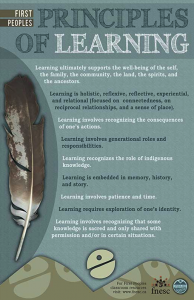Practicing the First Peoples Principles of Learning
One of the great recent changes to the British Columbia curriculum has been the introduction of the First Peoples Principals of Learning. The name recognizes that  these principles have emerged from the cultures and traditions of Canada’s First Peoples, but said principles are of clear benefit to all learners of all backgrounds. Thus, the BC educator has two compelling reasons to integrate the FPPL into their practice: contribution to the process of reconciliation, and more effectively meeting the needs of diverse learners.
these principles have emerged from the cultures and traditions of Canada’s First Peoples, but said principles are of clear benefit to all learners of all backgrounds. Thus, the BC educator has two compelling reasons to integrate the FPPL into their practice: contribution to the process of reconciliation, and more effectively meeting the needs of diverse learners.
Throughout my practicum experiences I have tried to embody and utilize these principles for the benefit of my students. This committment entailed using the FPPL on a daily basis and in all classes; the following are exemplars of how I incorporated the FPPL, but are by no means the extent of how they were included.
Learning ultimately supports the well being of the self, the family, the community, the land, the spirits and the ancestors.
When planning lessons and teaching I always to try to keep in mind not just how what I am teaching is relevant, but how it can actually contribute something useful to students’ lives. Doing so involves finding ways that students might be able to apply what they are learning, as in the case of a unit on China which I taught, the centerpiece of which was exposure to new schools of thought. Whether students find something in new ways of thinking that speaks to them personally, or whether they simply come away with an increased respect for diversity, the interests of the community are served.
Learning is holistic, reflexive, reflective, experiential and relational (focused on connectedness, on reciprocal relationships and a sense of place).
With every lesson I strive to help students make connnections between the material and themselves and their experiences and circumstances. Sometimes this takes the form of explicitly reflective activities, while at other times it is about simply suggesting connections. Whenever possible, I highlight the connections between topics that are not immediately relevant to students, and things that do affect them: for example, considering common themes and motivations of Canada’s past assimilationist policies and the lingering effects thereof, and the current experience of China’s Uighur minority.
Learning recognizes the roles of indigenous knowledge.
My lessons drew attention to the importance of indigenous knowledge in relation to  topics as diverse as residential schools and the Great Depression. I chose to augment my grade 8 unit on The Secret Path with selections from Mary John’s biography Stoney Creek Woman, to centre the First Nations experience and the importance of First Nations accounts when studying Canadian history. In the course of learning about the Great Depression, students learned about the impact of the replacement of indigenous stewardship with intensive European-style farming practices in causing the Dust Bowl and associated hardships.
topics as diverse as residential schools and the Great Depression. I chose to augment my grade 8 unit on The Secret Path with selections from Mary John’s biography Stoney Creek Woman, to centre the First Nations experience and the importance of First Nations accounts when studying Canadian history. In the course of learning about the Great Depression, students learned about the impact of the replacement of indigenous stewardship with intensive European-style farming practices in causing the Dust Bowl and associated hardships.
Learning is embedded in memory, history and story.
Every class I taught across my three practicums drew extensively on historical events and narratives as a way of understanding the present. Whenever possible, I gave my students the opportunity to hear directly from those about whom we were learning through the use of published recollections and other primary sources, as well as offering instructive stories of my own experiences.
Learning requires exploration of one’s identity.
As part of both my grade 8 humanities unit on residential school and my grade 9 unit on Canada before and during World War 1, I took care to highlight themes of injustice and inequality of ongoing contemporary significance as part of a clearly stated effort to encourage students to reflect on what it means for students to identify as Canadians. In particular, we had some very rich and deep discussions on what, if anything, present-day Canadians have in the way of responsibility for addressing past injustices committed by their country, and students were regularly prompted to reflect on how their learning changed their understanding of their country and of their role in national life.
